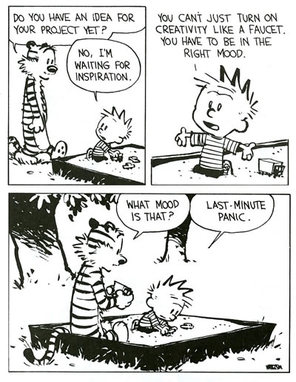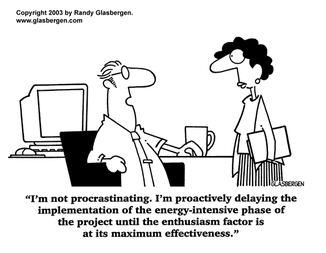PROMPT:From the lessons on procrastination and learning, choose two to four facts/strategies/pieces of information that particularly resonated with you. It could be because you agree with them, disagree with them or simply found them interesting. Explain why and give reasons for your choices. | MY THOUGHTS:Procrastination is everywhere. Let me first point out that it has taken me more than SIX tries to complete this blog post. Each time I log into Weebly, the buttons on my Bookmarks Bar seem more and more interesting. I've gone through more unused social media accounts in the last five minutes than I have in the last month. The point is, I'm trying to avoid the question. So if you'll let me continue, you can get on your way. Not leaving? Figures. Okay. Stop procrastinating. Stop it. STOP IT. Hey that reminds me... Here's a funny Youtube video. Gosh, I hope we're not marked for staying on task. I have to get to work. Okay. Enough. The first concept I found particularly interesting in the Procrastination Presentation was the reason teachers don't want to use technology, the "need for certainty, control and simplicity". Somehow I understood this concept before I learned what it was called. Nevertheless, when it was put into words for me, things began to make more sense. I can see from the student's perspective how much a teacher is expected to do in a classroom. It's a lot like being the captain of a ship, or the only wait-staff in a busy restaurant. With the amount of multi-tasking and decision-making going on, it seems crazy that anybody would want to risk using unpredictable technology in the classroom. I see now how the smallest uncertainty can create big problems for a teacher. This concept interested me because I expect it to change the way I help teachers with technology. I understand that you don't issue an order that's only half thought-out, and that you don't serve a dish that's only half-cooked. In the same way, a teacher can't be expected to integrate technology that they're not 100% comfortable with into their lessons. I plan to spend more time with my Placement teachers helping them master skills so that they're comfortable using them in class. The second concept I found relevant was the idea of the Procrastination Equation. At first I was a bit skeptical, but the math checks out for everything I procrastinate for. Understanding and recognizing the components of Expectancy, Value, Impulsiveness, and Delay have proved to be the first step in solving the procrastination problem. It's also easier to deal with procrastination because I can break down the big problem and solve it in smaller parts. For a big test, I may not be able to address the issue of expectancy right away, but I can address value by rewarding myself for study time. This concept has helped me avoid and solve many of those moments when I would otherwise procrastinate. The last idea that caught my eye was the theory of Fixed v. Growth Mindsets. This idea pretty much sums up my entire life. All the feedback I've ever gotten from teachers essentially says I have a fixed mindset about the things I'm not good at. Now, to a certain extent, this is true. I am not the best at everything (no matter how many times I tell you I am). Everyone has his/her own strengths and weaknesses. I learned that long ago from Kids' Television. Nevertheless, it doesn't hurt anyone to change one's attitude. After all, I may have grown up with a fixed mindset partially because I didn't know there was an alternative. When I heard about the Growth Mindset during the lesson in class, I asked why we couldn't have learned this concept in grade 9. I truly believe my high school mathematics experience would have been more enjoyable had I understood the Growth Mindset sooner. I plan to go through life with this in mind. After all, understanding that not all things come easily to people seems to be a big part of growing up. President Barack Obama essentially smacks you over the head with the idea of the Growth Mindset in his National Address to Students of 2009. I watched this right before leaving for Mackenzie on the first day of grade 9, and I've re-watched it at the start of every school year since. If you have the time, I strongly recommend it. Cleaning your apartment can wait. |




 RSS Feed
RSS Feed